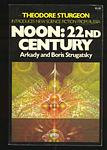The Greatest Polish, Russian "Science fiction, Fiction" Books Since 1950
Click to learn how this list is calculated.
This list represents a comprehensive and trusted collection of the greatest books. Developed through a specialized algorithm, it brings together 300 'best of' book lists to form a definitive guide to the world's most acclaimed books. For those interested in how these books are chosen, additional details can be found on the rankings page.
Genres
Science fiction is a genre of literature that explores the potential consequences of scientific and other innovations on society and individuals. It often features futuristic or imaginary settings, advanced technologies, and scientific concepts that are not yet fully understood or realized. Science fiction can encompass a wide range of themes, including space exploration, time travel, artificial intelligence, and alternate realities. It is a genre that allows authors to speculate on the future of humanity and the impact of scientific progress on our lives.
Countries
Date Range
Reading Statistics
Click the button below to see how many of these books you've read!
Download
If you're interested in downloading this list as a CSV file for use in a spreadsheet application, you can easily do so by clicking the button below. Please note that to ensure a manageable file size and faster download, the CSV will include details for only the first 500 books.
Download-
1. Solaris by Stanislaw Lem
The novel is a psychological exploration of human limitations and failures set against the backdrop of space exploration. When a psychologist arrives at a research station orbiting a distant planet covered entirely by a sentient ocean, he discovers the crew in disarray, haunted by physical manifestations of their subconscious fears and desires. As he grapples with the ocean's inscrutable nature and its unsettling ability to materialize human thoughts, he is forced to confront his own guilt and regret, embodied by the apparition of his deceased wife. The story is a philosophical meditation on the impossibility of truly understanding alien intelligence and the painful isolation of the human condition.
-
2. The Futurological Congress by Stanislaw Lem
In a dystopian future, the protagonist attends a scientific conference where he is exposed to a new hallucinogenic drug that transports him to a surreal and chaotic world. As he navigates through this bizarre reality, he becomes entangled in a conspiracy involving mind-altering technology, political manipulation, and the struggle for power. This satirical novel explores themes of reality, identity, and the dangers of unchecked technological advancements.
-
3. The Cyberiad by Stanislaw Lem
"The Cyberiad" is a collection of science fiction short stories that take place in a futuristic universe where robots and artificial intelligence are prevalent. The book follows the adventures of two master inventors, Trurl and Klapaucius, as they encounter various challenges and engage in extraordinary feats of engineering and problem-solving. Through witty and imaginative storytelling, the book explores themes of technology, creativity, and the nature of humanity, offering a captivating and thought-provoking reading experience.
-
4. Roadside Picnic by Arkady Strugatsky, Boris Strugatsky
"Roadside Picnic" is a science fiction novel set in a post-apocalyptic world where mysterious extraterrestrial visitors have left behind dangerous and enigmatic zones known as "Visitation Zones." These zones are filled with hazardous artifacts that grant strange and unpredictable powers to those who come into contact with them. The story follows Redrick Schuhart, a "stalker" who ventures into the zones to retrieve valuable artifacts while navigating the treacherous landscapes and facing the moral dilemmas that arise from the desperate and corrupt society in which he lives.
-
5. Noon, 22nd Century by Arkady Strugatsky
This book presents a collection of interconnected stories set in the 22nd century, a time when humanity has made significant advances in technology, society, and ethics. The narrative explores various facets of this utopian future, from space exploration and colonization of other planets to the profound changes in human relationships, work, and leisure. Through the eyes of its diverse characters, the book delves into the complexities and nuances of a world where humanity strives to balance technological progress with ecological sustainability and social harmony, offering a hopeful yet reflective vision of the future.
-
6. Menschen Wie Götter by Sergej Snegow
This science fiction novel unfolds in a distant future where humanity has achieved a utopian society through the development of advanced technology and social systems. The narrative explores complex themes of morality, immortality, and the essence of human nature, as the characters navigate a universe filled with diverse civilizations and the remnants of less advanced human societies. As the protagonists confront challenges that test their ideals and understanding of what it means to be truly civilized, the story delves into philosophical discussions on the potential and limits of human progress, the value of individual freedom versus the common good, and the eternal quest for knowledge and understanding in a boundless cosmos.
-
7. Metro 2033 by Dmitri Glukhovsky
This novel is set in a post-apocalyptic Moscow, where the remnants of humanity have taken refuge in the underground metro system after a devastating nuclear war. The story follows Artyom, a young man who embarks on a perilous journey through the dark, mutant-infested tunnels of the metro to seek help against a new, mysterious threat that endangers the fragile existence of the metro's survivors. Along the way, he encounters various factions vying for power and control, confronts his deepest fears, and questions his beliefs and the nature of reality itself. The narrative weaves together themes of survival, hope, and the enduring human spirit in the face of overwhelming darkness.
Reading Statistics
Click the button below to see how many of these books you've read!
Download
If you're interested in downloading this list as a CSV file for use in a spreadsheet application, you can easily do so by clicking the button below. Please note that to ensure a manageable file size and faster download, the CSV will include details for only the first 500 books.
Download




